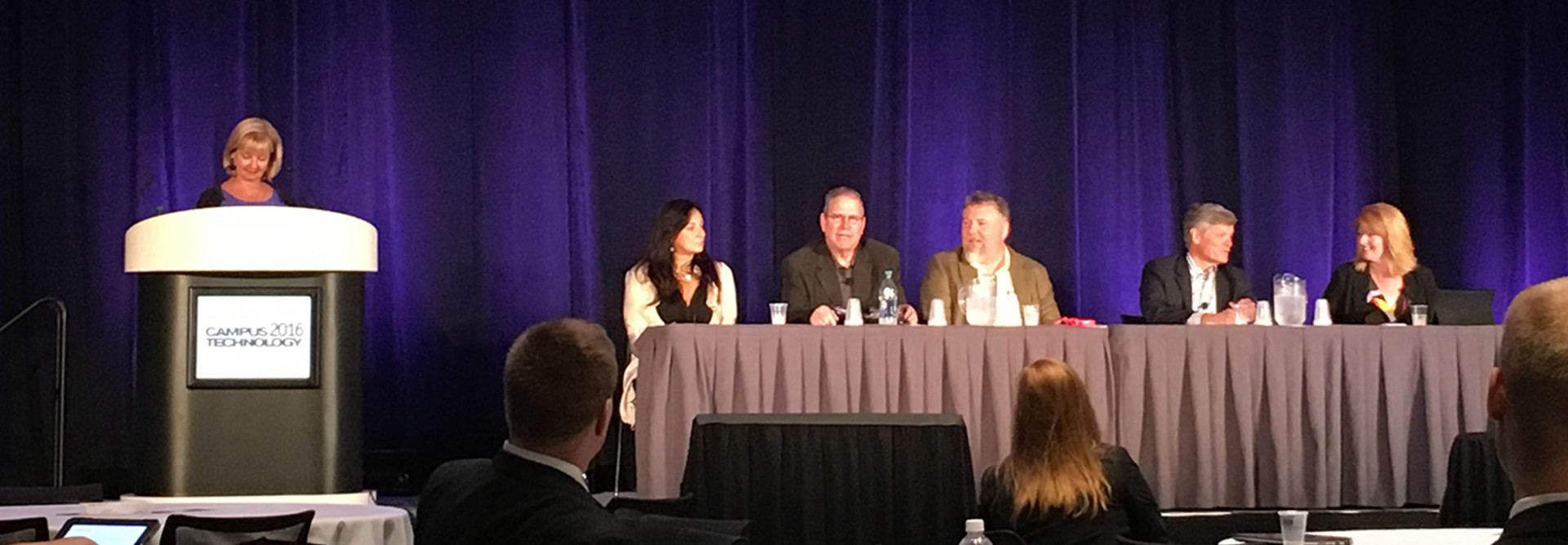Campus Technology 2016: The Road to the CIO’s Office
In a discussion for IT professionals considering a CIO role in their future, five panelists offered advice that might have been surprising.
“We’re not really in the technology business,” said Joe Moreau, vice chancellor of technology at Foothill–De Anza Community College. “We’re in the education business.”
His fellow panelists, all senior IT leaders in higher education, agreed. They spoke Aug. 3 at Campus Tech 2016’s panel, “What Does a Senior IT Leader Really Do Today and What May They Need to Do Tomorrow?”
Participants also included Jill Albin-Hill, vice president for IT and CIO, Dominican University; Wayne Brown, vice president of IT and CIO, Excelsior College; Jeff Cepull, vice president for information resources and CIO, Philadelphia University; and Susan Malisch, vice president for information services and CIO, Loyola University Chicago. P.B. Garrett, senior associate dean for academic innovation and chief academic technology officer at George Washington University, moderated the event.
Diverse Paths to Top IT Role
Asked to recall their journeys to the CIO’s office, the panelists described diverse backgrounds, from art and videography to programming and tech training.
Albin-Hill said that early in her career, as one of a handful of women on her company’s IT team, she sought to differentiate herself through excellent customer service. That value carries through to her current position, she said.
“That’s driven me to have the best help desk we can have,” she said. “Obviously, we have a great network, but … it’s not about what we have in the basement, it’s about how it’s being used.”
That view of technology also appealed to Brown, who said he isn’t fascinated by technology for its own sake: “For me, it’s what several of us have said already: We are in the business of graduating students to improve their lives.”
Malisch began her career as a coder at Southwestern Bell, but quickly realized that wasn’t a good fit. She transferred to the technology training department and subsequently worked in a variety of jobs — including coaching a women’s basketball team — and said that pushing herself to explore new opportunities paid off.
“Some of those challenges were the things that helped me the most to try something new, work with people, figure something out I’d never tackled before,” Malisch said. “I’d encourage you, even if you don’t have the experience [in an area], try it and it will stretch you beyond your comfort zone.”
Moreau studied art as an undergraduate, but said that proved to be beneficial when he switched to technology and found that it required analogous skills.
“The study of art taught me to be a systems thinker and to be a translator,” Moreau said. “As you’re studying art, you have to be able to look at a piece of art and understand the individual components and describe those and talk about how they work together or against each other.”
The Value of a Graduate Degree
Prospective CIOs may wonder if they need a graduate degree and, if so, whether a master’s degree is sufficient. Nearly all the panelists have graduate degrees (MBAs among them), and Brown has a doctorate. Generally, they said, a master’s is important for the role, particularly for someone who lacks prior CIO experience.
That said, panelists pointed out that graduate curricula outside technology, such as leadership management or education itself, may develop complementary skill sets.
“The value around the understanding of instructional design is fairly high,” Cepull said. “You can have the skill set to get the right tech people in the room, but if we’re in the business of education, some knowledge of learning theory and curriculum development can be very valuable.”
A Ph.D. is less critical, particularly at a community college, Moreau said. Brown said that obtaining his Ph.D. did have a positive impact on his role in academia, but that it wasn’t an investment that everyone should make. As a candidate for a CIO position, he said, having a Ph.D. didn’t make him a slam-dunk hire, but it was a differentiator that likely helped him stand out.
Brown also said that based on surveys of senior leaders in higher education, he believes the master’s degree has become expected: “I don’t think you’re going to make it by HR anymore [without a master’s].”
Coping with Leadership Change
Garrett noted that it’s not unusual for institutions to see a wave of change among senior leadership, as several individuals leave their positions in a short period of time. That poses a challenge for IT leaders, she said.
“How do you please the outgoing group and also wait for the new ones coming in who will have even higher expectations?” she said.
Moreau said he recognizes that incoming leaders have two primary concerns: They want to know that operations are stable, and they want an opportunity to influence the direction of the organization. Moreau said he seeks to reassure leaders on the first point, while acknowledging their desires on the second point, and that helps to smooth the transition.
Malisch advised that persistence is key, as CIOs are responsible for keeping initiatives moving even when other factors seem rocky or uncertain.
“I’ve been fairly persistent in some of the decisions we’ve had to make because they’re timely and they help support the team,” she said. “You have to have persistence and patience, knowing that some people want to wait to make big decisions until the new leaders come in and some people will say, ‘We can’t wait.’”
Toward a More Diverse Future
Looking toward the future, Garrett said that diversity in CIO hiring continues to need improvement. She pointed to research by Brown, which showed that women (at 28 percent) and minorities (at less than 10 percent) still make up a small proportion of CIOs.
“The pipeline isn’t any better,” Brown said.
What’s more, he added, only half as many women as men say they are interested in pursuing the CIO position. “I think it’s an uphill battle and something we have to keep after and keep visible,” he said.
Catch more updates from Campus Technology 2016 on EdTech's official event page.









